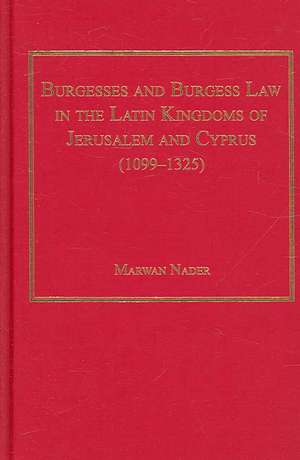Burgesses and Burgess Law in the Latin Kingdoms of Jerusalem and Cyprus (1099–1325)
Autor Marwan Naderen Limba Engleză Hardback – 28 oct 2006
Preț: 1054.71 lei
Preț vechi: 1286.24 lei
-18% Nou
Puncte Express: 1582
Preț estimativ în valută:
201.82€ • 211.15$ • 167.65£
201.82€ • 211.15$ • 167.65£
Carte tipărită la comandă
Livrare economică 02-16 aprilie
Preluare comenzi: 021 569.72.76
Specificații
ISBN-13: 9780754656876
ISBN-10: 075465687X
Pagini: 238
Dimensiuni: 156 x 234 x 14 mm
Greutate: 0.45 kg
Ediția:1
Editura: Taylor & Francis
Colecția Routledge
Locul publicării:Oxford, United Kingdom
ISBN-10: 075465687X
Pagini: 238
Dimensiuni: 156 x 234 x 14 mm
Greutate: 0.45 kg
Ediția:1
Editura: Taylor & Francis
Colecția Routledge
Locul publicării:Oxford, United Kingdom
Notă biografică
Marwan Nader is an Independent Scholar.
Recenzii
’This is an important book... Nader demonstrates an impressive command of both primary and secondary materials.’ Bulletin of the School of Oriental and African Studies ’... this work enhances our understanding of the institutional and social history of the Latin East, and contains important material on the reasons why those from non-noble backgrounds participated in the crusading movement and in the Latin settlement of the eastern Mediterranean in the twelfth and thirteenth centuries.’ Ecclesiastical History ’Nader's discussion of burgess jurisdiction is rich with examples and well grounded in the written evidence. As such, it will be very valuable for students and teachers.’ Speculum
Cuprins
Introduction; Chapter 1 Burgess Origins and the First Crusade; Chapter 2 Burgess Law-Making and Legal Institutions; Chapter 3 Borgesies; Chapter 4 Courts of Burgess Jurisdiction; Chapter 5 Church Courts; conclusion Conclusion;
Descriere
This is the first book devoted to the study of burgesses in the Latin Kingdoms of Jerusalem and Cyprus (1099-1325). It offers a comprehensive assessment of the contributions made by the non-feudal class to the development of legal and commercial institutions in the 12th, 13th and 14th centuries. Dispensing with the commonly held view that burgesses had only marginal influence, evidence is presented to illustrate how the existence of a 'middle class' was essential to the ambitions of the kingdoms' leaders.
















